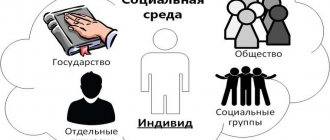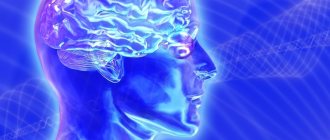Man as a biological species
| From the point of view of social science, a person is a representative of the species Homo Sapiens, who is endowed with upright walking, self-awareness, speech, the ability to acquire social skills, and have not only biological, but also spiritual needs. |
On the one hand, people, like animals, have instincts, but on the other hand, they are strikingly different from other representatives of the animal world. In the very definition of the concept “human”, social science contains information about the biological and social essence of Homo Sapiens. The social component is precisely the main difference between humans and animals.
| Animal | Human |
| 1) All actions are determined mainly by instincts, the influence of which is irresistible. | 1) Along with instincts, activity is regulated with the help of thinking and self-awareness. There is the ability to overcome your instincts. |
| 2) To survive, it adapts to the environment and changes its lifestyle only when external conditions change. | 2) Can transform the environment, consciously change lifestyle, create material and other values. |
| 3) Certain species can use available means to achieve their goals, but they are not capable of creating full-fledged tools. | 3) Can create a wide range of tools. Capable not only of physical, but also of creative and intellectual work. |
| 4) The existence and interaction with other representatives of the species is determined by the biological essence. | 4) In addition to the biological, there is a social essence and spiritual needs. |
Content
- 1 Definitions
- 2 Statuses and roles of the individual
- 3 How an individual’s personality is formed
- 4 How to distinguish between definitions
- 5 Conclusions
The problem of human development in society is important not only in psychology, but also in society. Despite this, not all people can find the difference between a personality and an individual. To understand this issue and understand how these concepts differ from each other, you should turn to terminology, and also understand what individuality is.
Individual and personality
| From the perspective of social science, an individual is a separate representative of the human race with all its inherent characteristics. This word was derived from the Latin individuum, which means “indivisible.” Usually it refers to a person as a biological being, without indicating how realized his social essence is. |
Let's explain with an example. Surely everyone has heard about the so-called “Mowgli children”, who, due to tragic circumstances, spent the first years of their lives surrounded by animals or in social isolation without communicating with people. There are several documented cases, in particular, the Indian girls Kamala and Amala, who grew up with wolves, the Italian boy Rono, etc. Unlike the fabulous Mowgli, the hero of R. Kipling’s work, after returning to civilization, these children never learned to speak , fully interact with other people and even eat human food that is familiar to us.
Can we call them individuals? Yes, you can. But the personality of these children remained undeveloped. Another example that allows us to see the difference between the concepts of “individual” and “personality” can be people with severe mental retardation or severe mental illness. Their personality remains unformed or is gradually destroyed, but at the same time they are, of course, individuals.
| In social science, personality is a complex of socially significant qualities and skills that allow a person to effectively interact with other people, engage in creativity, and create material and spiritual values. This is a kind of superstructure of the psyche that develops in the process of socialization (play, learning, work). |
As is easy to see, the definition of personality accepted in social science suggests that one cannot become one from birth. It relates to the social essence of a person, to the development of social roles, social norms, rules of behavior, etc.
Specific historical circumstances of life play a huge role in this process (social norms of our time and, say, the 14th century differ significantly). Also, the formation of personality is influenced by the cultural environment with all its national, religious and other characteristics. All these factors ultimately transform an individual into a personality.
Important!
Understanding social norms does not mean following them. If a person deliberately violates social rules (as, for example, hooligans or criminals do), he does not cease to be a person. This concept does not imply an ethical assessment of actions.
So, let us repeat once again how the biological component, which is included in the concept of “individual,” differs from the social one.
| Biological essence of man | Social essence of man |
| It manifests itself in its anatomy, physiology, characteristics of the circulatory, muscular and nervous systems, inherent in the entire human race. | It develops in the process of socialization, in the course of communication with other people. It manifests itself through the ability for creative work, understanding of social norms and rules, and self-awareness. |
“An analysis of the history of world culture confirms the connection between the concept of “personality” that appeared in the West during the crisis of traditional culture and the concepts of “freedom”, “self-awareness”, “creativity”, which makes it a cultural category - this gave me the basis to call the second major stage in world history culture, which opposed itself to its traditional type, personal-creative or, in short, personalistic.
The difference between “personality” and “man” is determined by the fact that “person” is a generic concept, and “personality” is an individual one, while “personality” differs from “individual” in that it is its special quality, but not innate, not immanent, but formed as a result of an individual’s mastery of certain cultural content; in other words, a person is born as an individual and remains one regardless of the social and cultural conditions of his existence, and he becomes—or does not become—an individual depending on the needs of the sociocultural environment and on his own activity.
Traditional society with its corresponding traditional culture needed a strictly assigned place in the social hierarchy for each of its members and a single type of mythological consciousness shared by all, sanctifying this hierarchy. Although historically the initial dissolution of “I” into “we” in primitive groups was modified to a certain extent in subsequent types of traditional society and somewhat widened the social “gap” into which some “dissidents” could squeeze, breaking out of the narrow framework of the impersonal “we-psychology” ” and corresponding behavior, however, until the breakdown of the feudal version of traditional society in Europe, a person whose attributive quality is the need and ability of spiritual self-affirmation, carried out in the course of free choice of life values and the forms of behavior and activity determined by them, could only be an exceptional phenomenon.
Typical modifications of the facelessness of the individual were the social institutions of monasticism and chivalry, legally established class rights and obligations, determined by belonging to the nobility, the clergy, the peasant community, the craft guild, and the trade guild.
The Renaissance, Reformation and republicanization - three ways of forming a person’s individual self-awareness and the right for everyone to choose their own moral, aesthetic, religious, political, existential values - gave birth to the Personality as a bearer of freedom of self-identification, self-realization, self-realization, i.e. independently chosen ideals, moral principles, life positions, religion (or rejection of any religion), political preferences, aesthetic and artistic tastes; the possession of freedom allows an individual, under certain conditions, to change his beliefs, his faith, his tastes, realizing his power over them, and not their power over himself; one of the first, most striking examples is St. Augustine, and then Martin Luther, Henry IV, Napoleon Bonaparte, Vissarion Belinsky, Leo Tolstoy, Nikolai Berdyaev, Wassily Kandinsky, Roger Garaudy, Boris Yeltsin...
I am now distracted from identifying the internal motives for such a change of beliefs and any personal value judgments of each mentioned case - we are only talking about the right of a person in a personalist type culture to his own opinion, and therefore to change it. It is significant that in various legal documents - bills, declarations, constitutions - “individual rights” received legal recognition, becoming, and remaining to this day, one of the main marking features of the democratic way of organizing the common life of people.
Thus, “personality” is a new European formation that gave birth to a democratic form of existence of society and is reproduced by it - that is why all attempts to restore the feudal-slave system, with all the features of totalitarianism in the Stalin-Brezhnev Soviet Union, in Hitler’s Germany, in Maoist China, in quasi-socialist regimes of Eastern Europe, Southeast Asia and Central Africa, were united in suppressing the personal principle in the members of society, although unable to achieve this goal even with the help of mass terror, concentration camps and “cultural revolutions” - the “genie” of personal identity released from a bottle in Europe in the middle of the second millennium AD, it turned out to be impossible to put it back..."
Kagan M.S., Personality formation as a synergetic process, in Sat.: Synergetic paradigm. Man and society in conditions of instability, M., “Progress-Tradition”, 2003, p. 214-215.
Individuality
In the process of personality formation, a person not only learns social norms that unite people, but also realizes his differences from others. Some of the differences between people appear from birth - even babies have different appearances and different temperaments. Over the years, differences in knowledge, skills, worldview, etc. are added to this. This is called individualization - self-determination of an individual, the formation of its unique qualities, worldview, moral and philosophical foundations.
| Individuality , as social science defines it, is a unique psychophysiological structure of a person. A unique complex that consists of temperament, character, intelligence, worldview, abilities and skills, external features, etc. |
This term emphasizes the uniqueness of each individual, his originality. After all, even monozygotic twins, who are exactly the same from a genetic point of view, acquire different life experiences over the years, and this entails more and more differences.
We will help you consolidate new material in social studies courses at the Skysmart online school.
What does “outstanding personality” mean in social studies?
The term “outstanding personality” characterizes a person as strong-willed and strong, distinguished from everyone else.
The signs of such a person are obvious: willpower, determination in achieving their goals.
Most often, people perceive such a person as a standard: for example, Yuri Gagarin. After his flight, a huge number of Soviet boys wanted to become cosmonauts. This is the psychology of the crowd - the bulk always looks up to one person.
Of course, a person cannot be a bright and outstanding person without individuality: these concepts are interrelated and mutually compensate each other.
Strong personality
Throughout life, a person can find himself in extreme situations, which become a test of how strong his inner core is - individuality and personality. How rooted and part of the “I” are his beliefs, principles, worldview, etc.
Austrian psychiatrists Bruno Bettelheim and Viktor Frankl, who were imprisoned in concentration camps during World War II, wrote that a person’s very life sometimes depends on the preservation of individuality. The conditions of the concentration camps led not only to physical exhaustion, but also to the destruction of personality - the goal of the fascists was to lower prisoners to the level of an individual occupied only with biological needs. In practice, although such an individual became an “ideal” obedient prisoner, he quickly lost the will to live, memory, abilities and even the instinct of self-preservation.
Frankl and Bettelheim, by their own admission, were helped to survive only by the desire to preserve their individuality - to continue mental work, to set life goals for themselves, even if their realization was unlikely at that time. So, Bettelheim, deprived of the ability to write, composed a book in his head, and Frankl, together with a group of doctors, organized a secret service for psychological assistance to other prisoners. A strong personality, as the highest stage of development, is characterized by the ability to overcome life circumstances, placing spiritual values not only above material, but also above biological needs.
So, we figured out what personality is in social science and how this term differs from concepts such as “individual” and “man”. In addition to the theoretical material, we offer a short test.
The concept of human individuality in Russian psychology
Probably, the famous Soviet psychologist Boris Gerasimovich Ananyev studied individuality most thoroughly. In his works, a person’s personality was considered not as any of its characteristic features or even as a combination of these features. Man, according to B.G. Ananyev, is a holistic structure.
Accordingly, individuality is not a simple accumulation of character traits or other properties. Everything is much more complicated. Individuality is a person, this is that very holistic and organic structure, what we call personality.
B.G. Ananyev considered a person’s individuality through the prism of several groups of important qualities. These are his physical properties, for example, height and weight, and psychological (the same character and temperament), and activity, that is, the characteristics of his performance of various types of work.
However, with individuality, not everything is so simple. In fact, it is of great practical importance for psychology, and therefore its research has been carried out for decades. In Russian psychology, the problem of human individuality is even highlighted, the study of which continues to this day.
How to differentiate between definitions
When wondering what the differences are between the concepts of “person,” “person,” and “individual,” many people become confused. Although these definitions are intertwined with each other, personality is the most ambiguous of them. In everyday life, this word often characterizes a person capable of performing a noble deed. In psychology, this term has more than ten interpretations. Moreover, a separate section of this science was created to study the relationships between people and individual communities.
Based on the information presented earlier, we can draw a logical conclusion that, in comparison with personality, an individual cannot be lost. His development begins from birth, and even becoming socially disadvantaged, he will retain his individuality. Forming one’s own “I” is the most important task of every person, the implementation of which depends on the beliefs of the society of which the individual is a part. Understanding one’s role in society and compliance with one’s status forms one’s personality, which can be assessed differently in individual communities.
There is a quote: “One is born as an individual, one becomes an individual, and individuality is defended.”
With its help, you can easily answer the question of what is the difference between these terms. Not every person manages to fully preserve their uniqueness. Attempts to imitate other people and conform to all the norms prescribed by society can provoke a loss of individuality. You can remain a unique person only if harmony is achieved with yourself and the world around you.
Differences between concepts
To summarize the above, let us list once again the main features and differences of the concepts under consideration. So, man is a general concept. Unlike the others, it can be used in a biological sense to refer to a member of the species Homo Sapiens. Moreover, in almost any context, the terms “personality” and “individual” can be replaced by the word “person”. But the statement will be more generalized.
An individual is a specific person. It is a technical or legal concept used in legal documents. It does not include any personal characteristics, but strictly indicates a specific person. From the point of view of law, an individual is a subject of legal relations (owner, heir, culprit of an accident). When we consider people as individuals, we consider them the same and neglect all their characteristics, except those that are important within the framework of the problem being solved.
A personality is a socialized person with character, temperament and worldview, actively interacting with other individuals. Personality does not arise on its own; it is formed through socialization that occurs in the process of growing up.
Individuality is a set of properties and qualities that make a person unique. It is formed in parallel with the personality. To better understand how personality differs from individuality, it is worth paying attention to what epithets these words are usually used with. About a person we can say that she is “strong”, “independent”, “independent”. Such epithets as “bright”, “memorable” or “unique” are more suitable for individuality.








